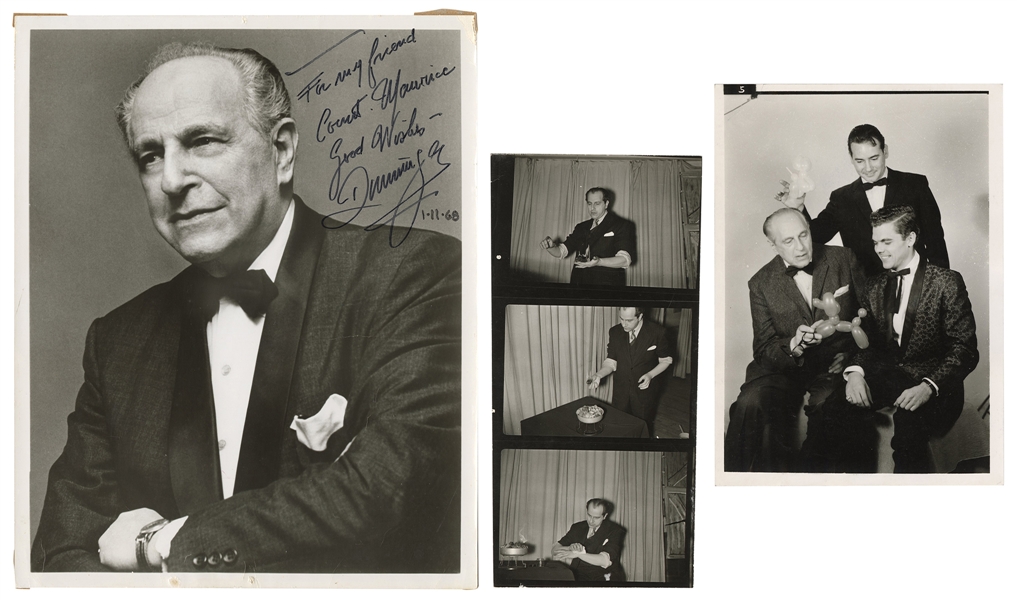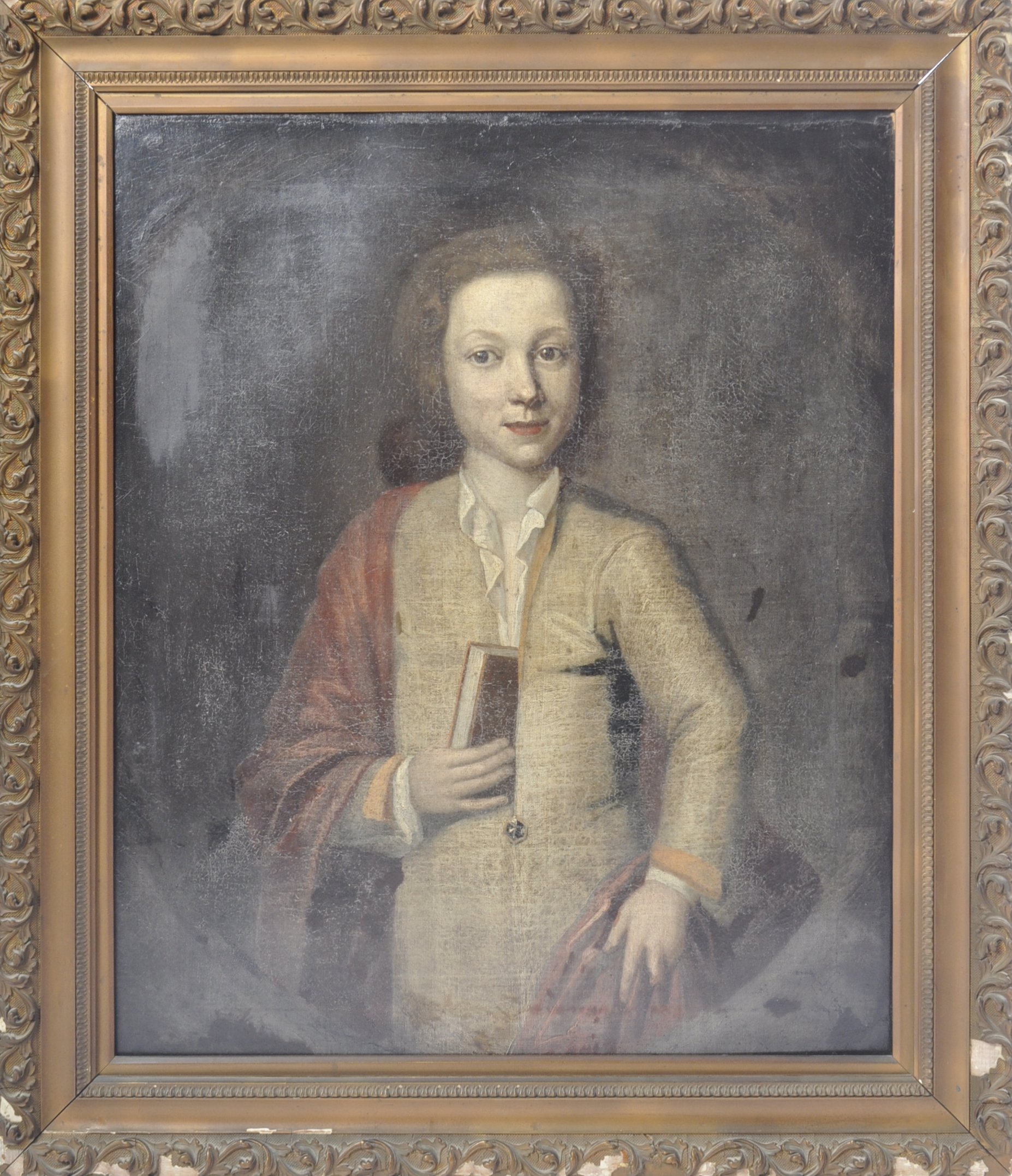Title: Archive of over 150 unpublished autograph and typed letters signed by Ira Gershwin to Edward Jablonski, spanning forty years, plus a few telegraphs, typed lyrics, etc. Author: Gershwin, Ira Place: Various places Publisher: Date: 1941-1980 Description: One to four pages each, signed in full, as Ira, or initialed, a few with signatures clipped off. Complete listing of the letters by date available. An extraordinary archive of letters from lyricist Ira Gershwin (1896-1983), offering rare insights into the mind and method of his brother and collaborator, composer George Gershwin and the production of George’s masterpiece Porgy and Bess. On May 26th, 1961, in perhaps the most significant letter in the collection, discussing Porgy and Bess and George Gershwin’s perception of the production, Ira writes: “As for ‘opera’ or even ‘grand opera; - of course. ‘Folk opera’ was a compromise arrived at so as to not scare the general public – or, rather – the average theatre-goer, away. I’m sure that somewhere I’ve written or told that the Met was eager to produce the work and that Otto Kahn offered George a bonus of $5,000 if the Met could have it. (George was flattered but realizing that at best the work could get a guarantee of 4, possibly 6, performances he turned it down for Broadway)…” The letters are written to Edward Jablonski, beginning when the latter was still in high school – Jablonski was to become an important historiographer of musicians, publishing numerous works including a major biography of George Gershwin who died of a brain tumor in 1937. Jablonksi also founded Walden Records in 1952, releasing many rare compositions by Gershwin and other musicians of the day. The correspondence not only provides a remarkable record of Ira and George Gershwin and the younger Jablonski, but also gives a vivid picture of the world of music and show business in the 1940s and 1950s, the period when nearly 90% of the letters were written. Gershwin writes much on his brother and his legacy (a good deal of his time was spent in managing the estate), his own ongoing projects in Hollywood and New York, his opinions of actors, actresses and singers, criticism of composers and lyricists, reviews of movies and dramatic productions, and his thoughts on new records being released, through Jablonski’s Walden as well as Columbia and other major players. The archive comprises a rare assemblage of UNPUBLISHED correspondence crucial to understanding the music and entertainment industry in the mid-20th century. In an undated cover letter to the collection that Jablonski wrote prior to his death in 2004 at age 81, he tells how the correspondence came about: “Late in 1940, while in high school, I began a correspondence, and as it turned out, a friendship with Ira Gershwin. Some months before I had become captivated by the music of George Gershwin and during the course of my research at the local library came across Ira’s address in a current Who’s Who. I had to tell him how I felt about his brother’s music and their songs. My first letter went to his home in Beverly Hills and was forwarded to Boston where he was with the first major work since his brother’s death, Lady in the Dark. To my delight, and I might add, surprise, Ira answered my letter and encouraged further writing – a bit of a mistake, for I became a letter writing pest. But he was patient, understanding, never patronizing and, as I learned years later, saved my letters…” The initial letter Jablonski wrote to Ira Gershwin is present with the collection, a rambling, six-page missive written from Bay City, Michigan, on New Year’s Eve, 1940: “…It all began, once upon a time, when I was listening to Raymond Paiges’ ‘Musical Americana,’ the announcer announced that Mr. Paige would play ‘Rhapsody in Blue.’ To a young fellow (I am 18) unschooled in music, this didn’t mean much. Then ‘Rhapsody’ began. You know – the clarinet. My ears pricked up. ‘why’ I said ‘there’s the music
Title: Archive of over 150 unpublished autograph and typed letters signed by Ira Gershwin to Edward Jablonski, spanning forty years, plus a few telegraphs, typed lyrics, etc. Author: Gershwin, Ira Place: Various places Publisher: Date: 1941-1980 Description: One to four pages each, signed in full, as Ira, or initialed, a few with signatures clipped off. Complete listing of the letters by date available. An extraordinary archive of letters from lyricist Ira Gershwin (1896-1983), offering rare insights into the mind and method of his brother and collaborator, composer George Gershwin and the production of George’s masterpiece Porgy and Bess. On May 26th, 1961, in perhaps the most significant letter in the collection, discussing Porgy and Bess and George Gershwin’s perception of the production, Ira writes: “As for ‘opera’ or even ‘grand opera; - of course. ‘Folk opera’ was a compromise arrived at so as to not scare the general public – or, rather – the average theatre-goer, away. I’m sure that somewhere I’ve written or told that the Met was eager to produce the work and that Otto Kahn offered George a bonus of $5,000 if the Met could have it. (George was flattered but realizing that at best the work could get a guarantee of 4, possibly 6, performances he turned it down for Broadway)…” The letters are written to Edward Jablonski, beginning when the latter was still in high school – Jablonski was to become an important historiographer of musicians, publishing numerous works including a major biography of George Gershwin who died of a brain tumor in 1937. Jablonksi also founded Walden Records in 1952, releasing many rare compositions by Gershwin and other musicians of the day. The correspondence not only provides a remarkable record of Ira and George Gershwin and the younger Jablonski, but also gives a vivid picture of the world of music and show business in the 1940s and 1950s, the period when nearly 90% of the letters were written. Gershwin writes much on his brother and his legacy (a good deal of his time was spent in managing the estate), his own ongoing projects in Hollywood and New York, his opinions of actors, actresses and singers, criticism of composers and lyricists, reviews of movies and dramatic productions, and his thoughts on new records being released, through Jablonski’s Walden as well as Columbia and other major players. The archive comprises a rare assemblage of UNPUBLISHED correspondence crucial to understanding the music and entertainment industry in the mid-20th century. In an undated cover letter to the collection that Jablonski wrote prior to his death in 2004 at age 81, he tells how the correspondence came about: “Late in 1940, while in high school, I began a correspondence, and as it turned out, a friendship with Ira Gershwin. Some months before I had become captivated by the music of George Gershwin and during the course of my research at the local library came across Ira’s address in a current Who’s Who. I had to tell him how I felt about his brother’s music and their songs. My first letter went to his home in Beverly Hills and was forwarded to Boston where he was with the first major work since his brother’s death, Lady in the Dark. To my delight, and I might add, surprise, Ira answered my letter and encouraged further writing – a bit of a mistake, for I became a letter writing pest. But he was patient, understanding, never patronizing and, as I learned years later, saved my letters…” The initial letter Jablonski wrote to Ira Gershwin is present with the collection, a rambling, six-page missive written from Bay City, Michigan, on New Year’s Eve, 1940: “…It all began, once upon a time, when I was listening to Raymond Paiges’ ‘Musical Americana,’ the announcer announced that Mr. Paige would play ‘Rhapsody in Blue.’ To a young fellow (I am 18) unschooled in music, this didn’t mean much. Then ‘Rhapsody’ began. You know – the clarinet. My ears pricked up. ‘why’ I said ‘there’s the music



.jpg)



.jpg)







Testen Sie LotSearch und seine Premium-Features 7 Tage - ohne Kosten!
Lassen Sie sich automatisch über neue Objekte in kommenden Auktionen benachrichtigen.
Suchauftrag anlegen